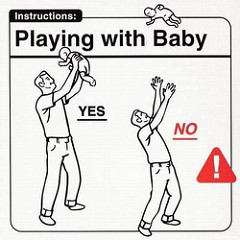Just about the most frequently enquired questions that new moms and dads have is exactly how many hours they ought to give to having fun with their baby? Now there is certainly no doubt that actively playing with infants is an important part of encouraging your little one develop and grow, but can there be such a thing as the “right” length of time to take playing? Therefore, precisely what does playing with your baby in fact involve?
The reality is that there is no set answer or guide that can definitively tell you how long you should spend playing with your baby. Often, it depends on the attention span of the child and their willingness to entertain themselves away from your immediate constant affection. However, the best way of judging how much time to spend actively playing can generally be deduced from following your baby’s lead. They will let you know when they are ready to play.
In the first couple of months, you will find that your baby has no attention span for or interest in play. A young baby’s days are generally spent eating, cuddling and sleeping. However, as they get on in months, you will find that their attention span and independence grows at an alarming rate. This is when you should introduce playtime with your child.
Initially, playing with your baby will involve nothing more than talking and interacting with them. Babies are always fascinated by their parents and will respond to any kind of conversation or interactions with them. As they become more responsive with their actions, you can introduce simple toys like stuffed toys or rattles. Different toys teach children different lessons about their own body, and it is important to introduce them to a varied selection of sensory toys for them to learn.
The important thing throughout is to pay attention to your baby. If they appear uninterested or tired, do not force play time upon them simply because you feel they haven’t played enough that day. When a baby is open to play, it will be obvious. It will be equally, if not more so, obvious when they have no interest in play! By paying attention to their moods prior to and during play, you can quickly learn the signs of whether they wish to play or not. Similarly, you should allow them to play in whatever way they want to. If they want to play with soft blocks, then play with soft blocks. If they want to have a conversation, have a conversation. Play time with parents is just as important as independent play time, so always be on the lookout for any opportunities where your baby can have your undivided attention.
